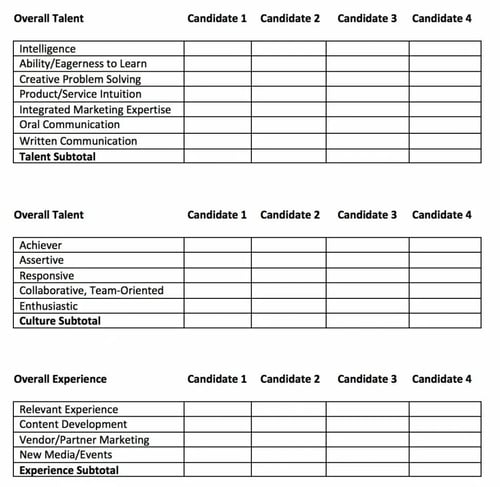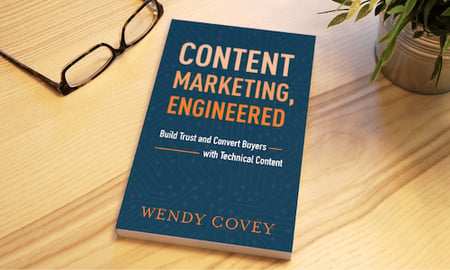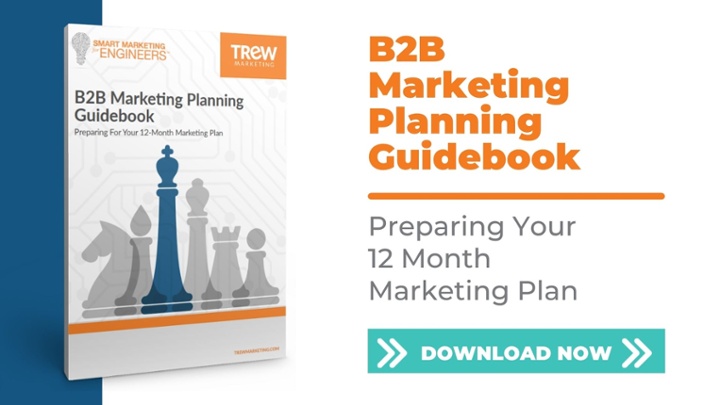Often in small engineering companies, the marketing responsibilities are shared among a few technical staff.
For instance, an R&D engineer may also be the IT guy who updates the website or writes code and content. Maybe a technical sales person is responsible for creating materials for a trade show in between customer visits and writing proposals.
If your company is growing and marketing is not keeping up, it may be time to consider hiring a dedicated technical marketing manager.
.webp?width=750&height=450&name=How%20to%20Hire%20a%20Technical%20Marketing%20Manager%20(1).webp)
Hiring a strong technical marketing manager has the potential to propel your marketing efforts forward and allows your engineering company to gain a team member who will add value to the organization.
Before you begin the hiring process, you need to know what to look for in a technical marketing manager, how to rank your potential candidates, and how to handle the interview process.
Qualities to Look For in a Technical Marketing Manager
First, focus on talent, then assess a candidate’s ability to fit within your company culture and their relevant experience. This is how we hire at TREW, and how we’ve had collective success hiring in the technical B2B space on behalf of our technical clients.
For engineering companies, it is often challenging to find a marketing manager candidate who is specifically familiar with your technology. But, if a candidate is talented and embodies the values you hold for your company, they’ll be quick to learn the in's and out of your technology and customers.
The following criteria that will help you know what to look for in a technical marketing manager.
Talent
Focusing on talent first captures candidates’ ability to learn, grow, and propel your company forward. A talented person can do much more than recreate a past experience – they can adapt to new ideas and understand what marketing efforts will serve your company best.
A talented person likely embodies these characteristics:
- Intelligence: makes decisions based on data, understands how to create actionable plans that get results
- Ability/Eagerness to Learn: wants to grow and understand new technologies, systems, platforms, and topics
- Creative Problem Solving: participates in developing new plans, can work resourcefully within tight budgets or resources
- Product/Service Intuition: understands a variety of products or application services, their markets, and how to best bring them to potential customers
- Integrated Marketing Expertise: understands a breadth of media, from traditional to digital, has a knack for growing their network
- Oral Communication: engages in conversation, holds the attention of a room, is polite and listens
- Written Communication: has clear, confident, and eloquent written communication, can develop new content
Culture
Your company will become what your employees embody. You can influence what your company becomes by hiring a marketing manager that embodies the qualities and values that you hold high. Employees that bring distrust, melodrama, volatility, inaction, or arrogance to your workplace fuel a poor company culture. Design your company culture, teach it, reward it, and hire to fit it. A candidate that is a good “culture fit” will work alongside your existing employees collaboratively and add value as they move forward.
Each company culture is different, but here is a list of pervasive culture attributes that we value here at TREW:
- Achiever: wants to see data-driven progress made toward goals
- Assertive: confident in their talents and decision-making process
- Responsive: can be trusted to respond quickly and efficiently
- Collaborative, Team-Oriented: works well with others, doesn’t always have to be the leader or have a leader
- Enthusiastic: engaging advocate for what they are involved with
Experience
If your candidate has proficient experience along with the talent and culture attributes you seek, they’ll be a rockstar in your company. However, if they have the talent and culture attributes but lack a bit of experience, they will need to be taught along the way. You can still hire this person, but consider them an apprentice to the person(s) currently running the marketing strategy or activities for a few months while they get a handle of your technology or a specific media area or partner relationship.
For a marketing manager, good marks of experience include:
- Relevant Experience: has worked with a company in a similar industry or application space
- Content Development: can create technical product content (case studies, white papers, data sheets) strategically and efficiently
- Product Management: has experience managing products or product lines and interacting with the potential customer associated with them
- Vendor/Partner Co-Marketing: has developed relationships with strategic partners or vendors, or experience developing new relationships
- New Media, Events: familiar with inbound marketing, social media, web lead conversion, events, etc.
Create a Scorecard
To keep track of your candidates’ talent, culture, and experience, create a scorecard where you (and any others you have interview your candidates) rate the candidates 1-5 in each category. A scorecard will give you a rubric to systematically rank your candidates, taking the pressure off of your recollection of conversation, and ensuring that you don’t put too much weight on a few characteristics and become enamored by someone who lacks a lot of important attributes, or dismayed by someone with a fault in one area but a breadth of great qualities.

Here's a scorecard to help you select the right candidate.
This scorecard uses the Talent, Culture, and Experience markers listed above, where talent makes up 40% of the candidate’s overall score, and culture and experience each make up 30%. Depending on the position and the attributes important in your company, you can modify the criteria to make it work best for you.
The Interview Process
Once you’ve begun promoting your position and receiving applications – from sites such as Indeed.com or through recruiters, social media, and your internal team – it will come time to start the interview process. The recommended approach detailed below is the process we follow at TREW, and is based on many years of hiring for a variety of marketing positions. It is proven, efficient, and requires an investment of time; but, when followed thoroughly, we believe it gives you the highest chance of finding the absolute best candidate for your technical marketing position.
From early screening to your final decision, it is efficient in the early stages so that when it comes time to conduct in-person interviews, you have narrowed down to three or four qualified candidates you can spend more time getting to know. Here are the steps for the interview process, with a short explanation of each:
Screen Candidates
Develop a list of 8-10 qualifiers and screen resumes to see if they have those qualifiers. Typical qualifiers include:
- Product management experience
- Web marketing experience
- Technical content development
- B2B sales or account management
- Vendor or partner relationships
- Years of experience
- Degree field
Your candidates may not possess all of these attributes, but screening based on specific criteria will help you filter out the candidates who aren’t a well-rounded fit for your company.
Email Qualified Candidates
Send initial questions to candidates that passed the screening via email. You’ll use the candidates’ responses to get a better understanding of who they are, what talents they have, and what they’re looking for in a career trajectory.
Conduct Phone Interviews
Use phone interviews to get more information about each candidate’s personality and past experience. You’ll base your questions on what you received via email to gain further insight or information.
Note: Have your candidates follow up after the interview by sending samples of technical white papers or data sheets they’ve created, examples of project timelines and results, and any other writing samples, along with three professional references.
Conduct In-Person Interviews
Invite your final candidates to your office for an interview. Because you’ve evaluated your candidates’ past experience well in steps 1-3, you now get the chance to dive more deeply into the way they would think and behave. Take this time to understand how your candidates solve problems and adapt to new challenges by asking them situational questions and giving them real scenarios that will arise within your team, company, and industry. Using these situational questions allows you to evaluate whether the candidate would have a good technical, creative, and analytical approach to solving problems for your organization.
In addition, bring in other members of your team and conduct up to three interview sessions with 1-2 people each. Use your team’s feedback to better understand if this person has the correct talents, “culture fit”, and experience to work well with your organization.
Note: we will not cover this here in detail, but you may also want to consider having your final two candidates prepare a presentation to give to the interviewing panel at your company. The presentations can be focused on topics such as their analysis of your current company’s marketing, or a specific challenge you give them.
Sample Interview Questions for Each Step of the Process
Now that you understand the steps in the interviewing process, let’s dive in and look at a sampling of the questions to ask at each point. Throughout the process, we recommend asking both behavioral and situational questions, such as those included in the list below:
Sample Email Questions for Screened Candidates
- What specific areas of the job description were most exciting to you? What areas were the least exciting?
- What do you feel are your three biggest strengths and how would they relate to the job description? What is your most prevalent weakness that relates to this position?
- Describe a recent product or project that you’ve managed. What was the product/project, what tools did you use to be effective in managing it, what were the roles of other team members, and what was the outcome of your effort?
- What are your long-term career goals and how would this position help you achieve them?
- What are your goals for compensation?
Sample Phone Interview Questions
- Tell me about the journey of your career. Which parts have been your favorite and why?
- Review with me the strengths and weaknesses you noted in your email.
- In your resume, you list quite a few different product/project marketing experience areas. In which experiences did you excel the most? Why were you so successful?
- You have/have not worked for other companies in our industry. How do you find (or feel about, if they have not had such a job) working in this market?
- How are our products and marketing different than with other companies you’ve worked with?
- Describe your comfort and experience with writing. Do you like to write, and if so, what types of writing do you like to do (data sheets, white papers, blog posts, contributed trade press articles, etc.)?
- What do you recommend as the best tools and processes to understand a target audience?
- Do you have experience with sales and marketing automation software, such as Salesforce.com, HubSpot, etc.? What other marketing-specific tools have you used and what skills do you have with regards to each tool?
Sample In-Person Interview Questions
- What role do you feel content plays in B2B marketing and how have the teams you’ve worked on created and promoted content?
- What do you think separates excellent technical marketers from really good ones?
- Tell me more about the marketing challenges and successes you have faced, and your specific role in meeting those challenges and achieving the successes.
- You are asked to be the technical consultant for our web redesign. Tell us the process you would follow, how you would interact with our marketing agency, the questions you would ask, the challenges you would expect to face, and how you would overcome those challenges. How would your leadership style help make the project successful? What types of metrics would you want to put in place to track success?
- We ask you, upon beginning your new role, to develop the marketing goals, strategy, and objectives for a new product launch. You have a month to work on the plan and at the end of the month, you’ll be expected to present the plan to our leadership team. What approach would you take to developing the plan, how comfortable would you be in delivering the presentation, and what would be the important elements of your presentation?
- You are the technical writer developing content for the biggest trade show we go to each year. During the content development and review process, you receive edits from several members of leadership and employees, and you find that there are some that are in direct conflict. I am unfortunately not available to provide assistance and the content is due that afternoon to the printer. What would you do to reconcile the feedback you received?
- We are invited to a partner event that will have a significant opportunity to garner media exposure and new sales leads. Imagine the product that you’re representing is something you’re very familiar with already (for example, the cell phone in your pocket). Explain how you would talk about the product and engage the partners, potential customers, and media at the event.
Understanding how to thoughtfully evaluate, carefully screen, and effectively interview candidates will help you find the best technical marketing manager for your company.
Like any process, hiring takes time and effort, but we believe following the guidance outlined will result in efficient and effective hiring. However, the decision to add to your team should be part of a larger marketing strategy.
Learn how to set your business up for marketing success with An Engineer's Guide to Marketing Planning, a detailed guide tailored to technical B2B business and marketing leaders.
TREW is a marketing agency dedicated to reaching engineering and technical audiences through a range of marketing initiatives. Contact us today to learn more about the services we offer.
SUBSCRIBE TO OUR BLOG FOR THE LATEST UPDATES
Morgan Norris
 Morgan believes that the process of brand positioning and messaging powers companies by aligning corporate leadership, building a story that fuels staff and engages customers, and creating a foundation for consistent content – and she’s seen these results come true for TREW clients time and again over the last decade. She holds degrees in Public Relations and Spanish, with a minor in Business from The University of Texas at Austin. Morgan, her husband, and three kids recently moved from Austin to downtown DC, where they enjoy walking the city, visiting the local museums, and playing a guess-who-is-in-that-motorcade game.
Morgan believes that the process of brand positioning and messaging powers companies by aligning corporate leadership, building a story that fuels staff and engages customers, and creating a foundation for consistent content – and she’s seen these results come true for TREW clients time and again over the last decade. She holds degrees in Public Relations and Spanish, with a minor in Business from The University of Texas at Austin. Morgan, her husband, and three kids recently moved from Austin to downtown DC, where they enjoy walking the city, visiting the local museums, and playing a guess-who-is-in-that-motorcade game.
About TREW Marketing
TREW Marketing is a strategy-first content marketing agency serving B2B companies that target highly technical buyers. With deep experience in the design, embedded, measurement and automation, and software industries, TREW Marketing provides branding, marketing strategy, content development, and digital marketing services to help customers efficiently and effectively achieve business goals.






 Morgan Norris
Morgan Norris

